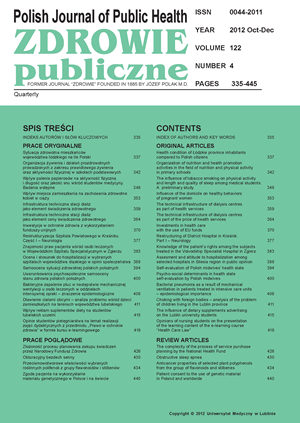The influence of dietary supplements advertising on the Lublin university students
DOI:
https://doi.org/10.12923/j.0044-2011/122-4/a.15Keywords:
dietary supplements, self-treatment, advertising, health behaviorsAbstract
Introduction. The media has a powerful influence on the audience; its power of manipulation often directs our actions and shapes our knowledge. The characteristic feature of the press that distinguishes it from other sources of information is the opportunity to go back to the previously read content. This makes it more reliable than other messages. Currently, numerous advertisements that encourage the use of multiple dietary supplements are placed in media.
Aim. The purpose of this study was to investigate whether and how the advertising of dietary supplements placed in popular magazines for women affects the young recipient.
Material and methods. The research method used was a diagnostic survey and the research technique – a questionnaire survey. The survey comprised 12 questions about the reception and the impact of advertising of dietary supplements on the respondents as well as 4 questions on demographics.
Results. The respondents noticed that in the press the majority of advertisements concern dietary supplements supporting weight loss (20%), or strengthening hair or nail (19%). Sixty five per cent of the respondents used supplements, including 52% of respondents taking 1 dietary supplement, and 48% using two or 3 preparations. Under the influence of advertising in the press, 12% of respondents started to use supplementation. Sixty seven per cent of respondents buy this kind of preparations for health problems, rather than refer to the doctor for expert advice. Seventy six per cent of consultees believe that dietary supplements are completely safe to use.
Conclusions. Respondents willingly use dietary supplements. One of the reasons for their reaching for supplementation is the effect of advertisements appearing in the press. Respondents have great confidence in the safety of dietary supplements; often use them without consulting a doctor or a pharmacist.
References
1. Kunachowicz H, Troszczyńska A, Żywność wzbogacona i suplementy witaminowo-mineralne a ich rola w prawidłowej diecie człowieka. Now Lek. 2005;74(4):533-8.
2. Ustawa z dnia 25 sierpnia 2006 r. o bezpieczeństwie żywności żywienia (Dz. U. z dnia 27 września 2006 r.)
3. Hołderna-Kędzia E. Suplementy diety i żywność funkcjonalna. II Kongres nt: Żywność, żywienie a zdrowie w Polsce zintegrowanej z Unią Europejską. Postępy Fitoterapii. 2004;13 (3):153-5.
4. Jarosz M. Suplementy diety a zdrowie. Warszawa: Wydawnictwo Lekarskie PZWL; 2008.
5. Anuszewska E. Rynek suplementów diety. Panacea – Leki ziołowe. 2011;3(36):8-11.
6. Rajska-Neuman A, Wieczorkowska-Tobis K. Samoleczenie – szansa na poprawę czy potencjalne zagrożenie sprawności funkcjonowania starszych pacjentów? Farm Pol. 2011;67(4):258-65.
7. Kurczewska U. O samo leczeniu i lekach bez recepty. Farm Pol. 2005;61(8):395-9.
8. Klaudel L. Pogranicze pomiędzy lekiem a suplementem diety. Panacea – Leki ziołowe. 2006;2(15):6-7.
9. Lek a suplement diety – Forum w Centrum Fitoterapii. Panacea – Leki ziołowe. 2006;3(16):5.
10. Bułaś L, Skowron A, Olczyk P, et al. Ocena doradztwa farmaceutycznego w samoleczeniu w wybranych aptekach województwa śląskiego. Farm Pol. 2011;67(2):73-7.
11. Jarosz M, Dzieniszewski J. Uważaj, co jesz, gdy zażywasz leki. Interakcje między żywnością, suplementami diety a lekami. Warszawa: Wydawnictwo Lekarskie PZWL; 2007.


